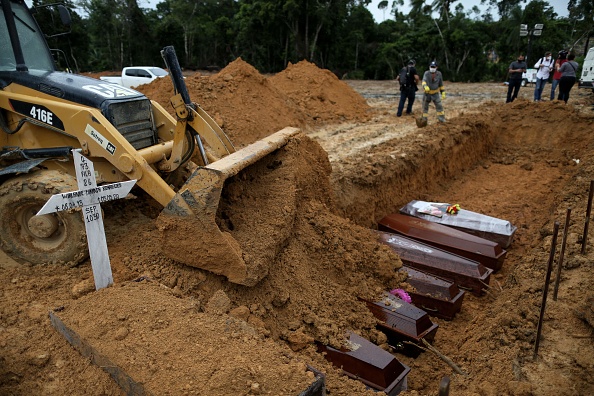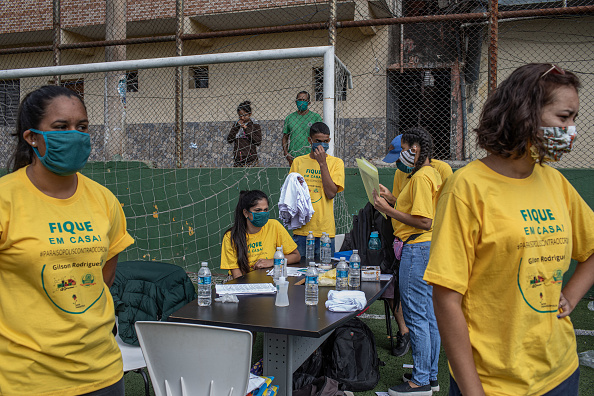
SHOWMAN BELITTLES VIRUS AND ITS VICTIMS
During Bolsonaro’s presidential campaign, many international media outlets compared the leader to be to US president Donald Trump. Said outlets compared both men’s populist rhetoric, controversial statements and their extensive use of Twitter to attack political opponents. While some of the comparisons between both men are a bit shallow, when it comes to this crisis both politicians have shown apathy towards the severity of the pandemic.
While Trump initially downplayed the crisis and went as far as to call it a hoax, he eventually changed his stance and advised people to stay at home by the end of March (though he is now calling for an abrupt end to the lockdown, but that is another story). By contrast, President Bolsonaro was steadfast in his anti-lockdown, anti-social distancing stances.
Bolsonaro’s disregard for the virus is evident throughout most of his statements to media regarding Brazil’s rising death toll. On April 29, the death toll in Brazil had reached 5,000, with 474 of said deaths recorded on that day. However when a journalist inquired the president on these deaths he calmly responded with: “So what? I mourn (the deaths), what do you want me to do? My name’s Messiah (referring to his middle name Messias), but I can’t work miracles.”
As previously stated, the president called the virus “a little flu” and called out the media for supposedly overhyping the situation and creating mass hysteria. The president’s antics did not stop there, as he would continue to make public appearances, subtly signalling to the public that he is going about his normal life just as they should to. While the President has been resisting a lockdown, the Federalist political system has allowed state governors to ignore Bolsonaro’s stances and put in lockdown measures of their own.
To add fuel to the fire, President Bolsonaro has been making grand spectacles to challenge the risks and dangers associated with the virus. Like Trump, Bolsonaro has been actively encouraging protests against lockdown. He would go a step further, however, as he participated in an April 20 anti-lockdown protest in Brasilia, where crowds of people flooded the streets waving Brazilian flags and holding pro-Bolsonaro placards. Addressing the crowds, Bolsonaro, who wasn’t wearing a facemask, called the protestors patriots who are defending individual freedom, which, he claims, state governors are trying to take away. Weeks later he held a much more nonchalant display towards the virus; on May 10 the president planned to host a barbeque at the presidential palace but he then called it off sparking speculation that public criticism might have finally gotten to him. Those speculations soon subsided as Bolsonaro opted to instead attend a floating barbeque, where he was filmed happily riding on a jet ski and telling his friends: “Seventy per cent are going to catch the virus. There’s nothing to be done. It’s madness.” Understandably, the President’s actions prompted a public outcry, as many politicians and citizen used social media platforms to note that the death toll in Brazil had already passed the 10,000 mark.
The primary reason why the President has resisted lockdown measures was because of the adverse affects it would have on the economy. Speaking to Majalla, Doctor Sodfa Mohamed, a professor at Cairo University’s
Centre for the Study of Developing Countries and an expert in South American affairs, noted that 40 per cent of the Brazilian population work in the informal economic sector. In other words, 83 million Brazilians rely on daily wages to survive. Moreover, as those informal sector workers are a major driving force for the economy, forcing them to stay home will have a detrimental effect on the economy.

STATE GOVERNERS GO THEIR OWN WAY
Because Bolsonaro has shown no intention of tackling the virus, state governors in Brazil have decided to implement their own measures to protect those residing in their states. The governor of Tefe in the Amazon was one of the first to impose a state-wide lockdown, as residents would face charges if they left home. The only exception to that law was visits to hospitals, pharmacies and supermarkets. Soon after, northern state governors have imposed lockdowns, however in Sao Paulo and Rio de Janeiro, so far the worst affected areas in Brazil, have yet to have full lockdowns enforced. Instead, Rio’s governor, Wilson Witzel, gave a recommendation for citizens to self-isolate, and left it up to the state’s 92 mayors to decide whether or not they should impose a lockdown. Meanwhile, Sao Paulo’s state governor, João Doria, chose to enforce self-quarantine and even went as far as to close schools and most businesses. Despite his tougher stance, he would back down when Bolsonaro attacked his policies after a video emerged of policemen handcuffing a middle-aged woman for breaking lockdown measures. Just like that the governor changed his policy to advisory one rather than mandatory one. Though self-isolation wasn’t enforced, mobile carrier data showed that initially 70 per cent of Sao Paulo’s population complied with quarantine. But, weeks afterwards those same figures showed that now only 50 per cent of the residents are following the governor’s recommendation.
VOLUNTEERS HELP FAVELA RESIDENTS, WHILE GANGS ENFORCE CURFEWS
Brazil’s slums (called favelas) face a unique challenge of their own. Most of these shantytowns are small and overcrowded, making social isolation a difficult task for most if not all residents. Furthermore, most favela residents rely on daily wages to survive; as such many can’t afford to stay at home. Nevertheless, some favela residents do find themselves forced to abandon work if their towns enforce closure of businesses. While Dr. Sodfa Mohamed does say that the government offers welfare programs to those who work in the informal economic sector, the benefits offered are not enough to meet the needs of most families.
Like most state governors, the residents in favelas came to the realization that the federal government can’t be relied on for help. Subsequently, many volunteers have taken it upon themselves to help their communities. A recent video report from The Guardians followed a young activist in the Acari favela who was gathering donations to make and distribute food parcels and “Coronavirus protective kits” (containing items such as face masks and soap) to residents. Many other activists are also shown to hand out information flyers telling people about the risks of COVID-19 and how they can protect themselves from the virus. The video highlighted the lack of basic needs in these favelas, for instance many houses do not have clean running water, many don’t have soap and most are shown to lack facemasks. Another group of volunteers in Sao Paulo’s Paraisópolis favela have also been distributing food to the residents, and they have also been able to get private ambulances to their area. These volunteers have also tried to develop their own quarantine system, as they turned one building into a quarantine house for the ill, and they also transformed closed schools into temporary boarding homes for the homeless.
In an even more bizarre development, drug gangs in some favelas have started to enforce a curfew on residents. Reports have shown that gangs in Rio’s City of God favela have been telling residents to not come out of their homes after 8:30 PM, or else they might face retribution from them. Many gangs have cited that they are filling the vacuum left by the government, and some have even said that they are the “last line of defence” against the virus.

BOLSONARO LOSING ALLIES AND SUPPORT
On April 16, President Bolsonaro dismissed his health minister Luiz Henrique Mandetta after both men disputed the government’s COVID-19 response. Mandetta publically criticized the president’s calls to reopen the economy, as he insisted that businesses should remain closed and people should stay home to stop the spread of the virus. The dismissal is a huge blow for Bolsonaro as he lost a cabinet member who was with him since he took on the presidency, moreover Mandetta was a popular figure among the Brazilian public. Just one week later, justice minister Sérgio Moro resigned from his post in protest of the government’s policies. Both events triggered loud cheers in many Brazilian cities, as residents came out of their windows to bang on saucepans and chant anti-Bolsonaro slogans. Dr. Sodfa Mohamed has told Majalla that ministerial officials aren’t the only politicians turning against the president, as many federal governors who supported Bolsonaro in the 2018 election are now dismissing his polices and leadership. For instance, Sao Paulo governor João Doria was once one of the president’s biggest allies, has now become one of his loudest detractors, even stating that his state is at war with the Coronavirus and the “Bolsonaro virus”.
When asked whether the left wing can capitalize on the crisis and use it for the 2022 election, Dr. Sodfa Mohamed stated that several factors would have to come into play. For instance, the left would still need to alleviate its public image, which was fractured following several corruption scandals. Furthermore the left would need to put forward a candidate that could appeal to Brazilian masses. However, she did not that both Bolsonaro’s falling approval ratings and the increase in anti-Bolsonaro protests present a good opportunity for the left.
WILL HOSPITALS COPE WITH THE PANDEMIC?
Brazil has a universal healthcare system, however studies show that the public health sector in the country is ill equipped to handle a crisis such as the Coronavirus pandemic. According to Health Management journal, sixty nine per cent of the ICU beds in Brazil are in private hospitals; meanwhile the other 35 per cent of ICU beds are in public hospitals. This imbalance is further aggravated by the fact that only 25 per cent of the population has private healthcare coverage, in other words the vast majority of Brazilians do not have access to ICU beds. Furthermore, Dr Sodfa Mohamed stated that Brazil has a history of viral outbreaks that have caused strain on the health sector, for instance just as recent as 2015 a large Zika virus outbreak happened in the northeastern region of the country adding pressure to public hospitals as well as health officials. The professor went on to say that the fact that budget cuts have been happening on the health sector since 2016 doesn’t help matters. As it stands, Brazil looks to become one of the newest hotspots for the Coronavirus, but political divisions, apathy and incompetence has rendered the federal government ineffective, thus costing the lives of thousands of Brazilians and in spite of the rising daily death toll, President Bolsonaro has shown no signs of policy reconsideration.








